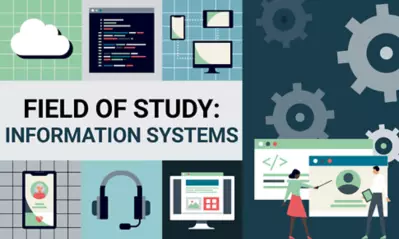Articles > Information Technology > What is CIS (Computer Information Systems)?
What is CIS (Computer Information Systems)?

Written by Laurie Davies

Reviewed by Kathryn Uhles, MIS, MSP, Dean, College of Business and IT
You're probably familiar with IT (information technology), but what is CIS? Whether you’re interacting with friends on a social network, buying a product in an online marketplace or producing personalized content for business customers, you’re putting a computer information system to work for you.
What is CIS in the business world?
Worldwide employment website Indeed .com addresses "What is CIS and why is it important." It says a computer information system (CIS) “facilitates the conversion of raw data into useful information.” Basically, a CIS helps business leaders make decisions based on data. It helps answer questions such as:
- Will a process be profitable?
- How can we target a product to consumers who visited our company website?
- Can a combination of artificial intelligence (AI) and human labor get the job done more efficiently?
In a broader sense, businesses and organizations rely on CIS to carry out and manage their operations, interact with their customers and suppliers, and compete in the marketplace.
As such, you might think CIS involves computers or databases — and you’d be mostly right. But, as a category, information systems is a much broader umbrella in the field of computer science. According to Techopedia .com, CIS can be envisioned as a triangle with three main components: people, processes and IT.
People – Without people, a CIS wouldn’t operate properly. IT professionals, programmers, system analysts, high-level managers and help-desk workers are all part of an IS.
Processes – Processes are the activities carried out in a business for specific goals. For example, on a vehicle assembly line, the process of the line production of car parts would be part of the information system.
IT – Information technology, or the use of computer hardware, software and data, ensures the information system works and can be indexed and interpreted for effective use by an organization.
There’s no doubt that CIS affects many parts of the modern world, but how can you break into the field? It’s an important aspect of modern computer science, but exactly what kind of information systems jobs are out there? Read on to discover more about degree and job possibilities.
What's the difference between IS and IT?
An Information Systems degree sounds like an Information Technology degree, but it’s not quite the same thing.
In computer science, Information technology falls under the information systems umbrella. Information technology is more specific to the hands-on, technical type of content/program where students learn about hardware, software and developing the user side of technology. Cybersecurity, for example, is one aspect of IT.
An information systems program, on the other hand, will more broadly address the technology, people and processes.
What skills do you need for computer information systems?
According to the online career platform Zippia .com, information systems managers must be skilled in:
- Procedures
- Information technology
- Customer service
- Project management
- Data entry
- Hardware
- Technical support
- Software development
- Business process
- Disaster recovery
What can I do with a computer information systems degree?
What is CIS' job growth outlook? According to BLS , employment in computer and information technology occupations is projected to grow about 377,500 openings each year, from 2022 to 2032.
Information systems professionals span almost every conceivable professional category, including healthcare, air travel, financial services, manufacturing and education. Entire companies are even built around information systems , including eBay, Amazon and Google.
According to Indeed .com, careers in information systems “are typically in high demand because most companies rely on technology, and software and computer systems are constantly changing.”
But just what will a master’s in information systems do for you?
- If you have a bachelor’s degree and are thinking of getting into the information systems field, enrolling in a master’s degree program like a Master of Information Systems may offer advantages.
- A master’s degree prepares successful graduates for an array of information systems jobs.
- A master’s degree may also enable you to grow your existing computer science skills. In-depth knowledge of an ever-changing industry, after all, adds value to almost any organization.
According to Indeed .com, professionals in management information systems (one area of specialty within the CIS field) who earn a master’s degree may expand their job opportunities. Completing a Computer Information Systems program can even be a requirement for some positions. Typically, they’ll learn valuable communication skills and take classes on advanced topics, such as:
- Database management systems
- Programming languages
- Information system design
- Computer networking
- Business
What do you learn in a Master of Information Systems degree program?
Students conceptualize, test and deploy their own information system, as well as learn about privacy, government regulations and security concerns. They develop the skills to deal with all three so they can keep themselves and their clients safe in the information systems and IT world.
The master’s program is different from a bachelor’s degree because it focuses more on real-world corporate situations, like using leadership skills to solve interpersonal or structural problems in tech.
What information systems jobs are out there?
One of the main careers you can expect to pursue with an MIS is as a computer and information systems manager . These professionals manage computer-related activities for organizations, such as technical services, application development, computing services and data process.
As of May 2023, computer and information systems managers earned between $101,590 and $239,200 , with a median wage between $169,510, according to BLS. BLS also projects the job outlook is estimated to grow 15% from 2022 to 2032.
Salary ranges are not specific to students or graduates of University of Phoenix. Actual outcomes vary based on multiple factors, including prior work experience, geographic location and other factors specific to the individual. University of Phoenix does not guarantee employment, salary level or career advancement. BLS data is geographically based. Information for a specific state/city can be researched on the BLS website.
BLS Occupational Employment Projections, 2022-2032 is published by the U.S. Bureau of Labor Statistics. This data reflects BLS’ projections of national (not local) conditions. These data points are not specific to University of Phoenix students or graduates.
Other CIS jobs that require bachelor- or masters-level degrees are:
- Information Systems Analyst
- Computer Systems Analyst
- IT Security Analyst
What is CIS education that works for you?
If you like what you’ve read about what is CIS and you’re ready to learn more, University of Phoenix offers these online CIS degree programs :
- Bachelor of Science in Information Technology
- Master of Information Technology
- Competency-Based Master of Information Technology
In a competency-based program, each credit is tied to a competency, or measurable skill, that can help improve your performance on the job. Since you may have some of these skills already, you can demonstrate what you know quickly, earn credit for it and spend more time learning something new.
Choose the MIS-CB if you:
- Already work in a professional setting
- Prefer to learn independently
- Have strong organizational and time management skills
- Want instructor support as you work at your own pace

ABOUT THE AUTHOR
A journalist-turned-marketer, Laurie Davies has been writing since her high school advanced composition teacher told her she broke too many rules. She has worked with University of Phoenix since 2017, and currently splits her time between blogging and serving as lead writer on the University’s Academic Annual Report. Previously, she has written marketing content for MADD, Kaiser Permanente, Massage Envy, UPS, and other national brands. She lives in the Phoenix area with her husband and son, who is the best story she’s ever written.

ABOUT THE REVIEWER
Currently Dean of the College of Business and Information Technology, Kathryn Uhles has served University of Phoenix in a variety of roles since 2006. Prior to joining University of Phoenix, Kathryn taught fifth grade to underprivileged youth in Phoenix.
This article has been vetted by University of Phoenix's editorial advisory committee.
Read more about our editorial process.



